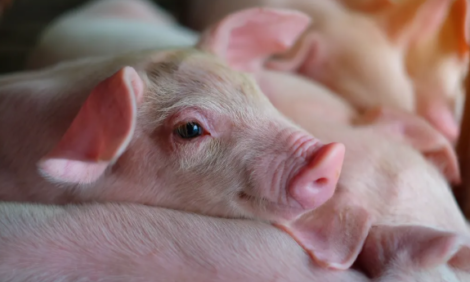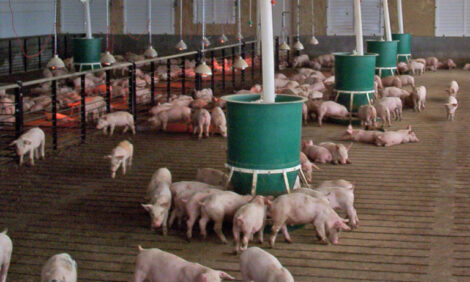



Marketing 'Niche Pork'
By Dr Morgan Morrow, North Carolina State University - Consumers have recently shown a surge of interest in purchasing pork and other agricultural products that are not produced by corporations or those using large-scale farming techniques, for example, the use of antibiotics or pesticides. Producers who market this “niche pork” have a long way to go before they can satisfy consumer expectations, particularly in terms of product identification and traceability.
 Dr Morgan Morrow Swine Veterinary Specialist |
If pork is channeled through larger abattoirs and traditional markets, it is practically impossible to know where it came from. However, other smaller markets that allow traceability exist for all farmers.
Farmers’ markets are the best examples of these alternative markets, and they are becoming increasingly common across the U.S. Selling pork at old-fashioned roadside stands, directly to specialty restaurants, and more recently, directly to consumers on the Internet all allow farmers to brand their product for niche markets.
Farmers’ markets are now an established link between consumers and farmers. Certain consumers want locally grown fresh food and will pay more to connect directly with the producers. There has been a 111 percent increase in the number of farmers’ markets from 1994 to 2004. Fruits, vegetables, and other horticultural crops currently dominate the commerce, but meat sales are rising and present a major opportunity for pork producers.
Farmers’ markets are generally organized and run by participating farmers, but some, for example, the Raleigh Farmers’ Market, is run by the North Carolina Department of Agriculture and Consumer Services. Regardless, they all have their own rules and regulations, some prohibiting the sale of meat. A recent survey by the USDA (http://www.ams.usda.gov/tmd/MSB/PDFpubList/FarmMark.pdf) reported that only 19 percent allowed the sale of milk and dairy products, while 37 percent allowed the sale of meat and poultry products. But over the past five years, meat sales have been surging. Consumers want to buy pork from farmers.
In North Carolina and in other states, roadside stalls are also increasingly becoming the point of sale for meats and other farm produce. For smaller to medium-sized farms, this kind of niche marketing can be critical to success in a business dominated by supermarkets and the wholesale distribution systems.
Another major, and growing, outlet for the sale of pork is CSA (Community Supported Agriculture). This unique concept originated in the 1960s in Switzerland and Japan. Consumers there, concerned about the safety of their food supply, teamed up with farmers looking to diversify and stabilize their markets. Basically, consumers pay the farmers up-front to supply them with a share of the farm’s production for that season. If the farmer has a bad year the consumer-members get less; conversely, if it’s a bountiful year, they get more.
In the U.S. there are more than 400 CSAs. Most operate in the Northeast, but the West Coast market is also growing. In North Carolina the popularity of CSAs has increased dramatically in the last 10 years.
This system engages consumers in a much closer relationship with farmers, as consumers share some of the farmers’ risks associated with the weather and market vagaries. Long-term CSA members are highly committed to building a shared commitment to a local, sustainable, and equitable agricultural system, one with which they can identify and trust to supply them with food that is produced in a way consistent with their beliefs and desires.
CSA farmers usually use organic or biodynamic farming techniques. Biodynamics is based on a series of lectures given by Austrian philosopher Rudolf Steiner in 1924 and is “a method of agriculture which seeks to actively work with the health-giving forces of nature,” according to a Web site on the movement: http://www.biodynamics.com/. The CSA concept actually arose within the biodynamics movement. To better engage their members, some CSAs require or encourage their members to work on the farm. They believe this helps create a stronger bond between the farmer and the customer and helps increase the satisfaction of the arrangement for both parties. In addition, some CSAs have a mission to incorporate and engage special groups of the disenfranchised, e.g., the unemployed or homeless.
CSA farms sometimes offer a wide range of products, but sometimes they ally with other farms, each providing a more limited range of products. Produce usually includes vegetables, herbs, fruit, eggs, milk, and meat.
Farmers should consider the following points before deciding to sell pork in nontraditional ways:
Locate a federal- or state-inspected abattoir that can process the pigs. A state-inspected abattoir restricts product to only intrastate sales unless it is a so-called Talmadge-Aiken plant. For these plants, now known as Federal-State Cooperative Inspection Plants, the USDA has contracted with the state to undertake federal inspection and so allow the interstate sale of meat. Approximately 10 states have entered into these cooperative agreements, and about 250 meat and poultry plants are licensed. If farmers are looking only for local (intrastate) sales, then a state-inspected plant will suffice.
Custom processing by local meat lockers offers another opportunity, as most states allow producers to sell portions of live animals before they are slaughtered. However, local restrictions on these “freezer meats” vary widely. Also, the processor should be able to package the pork into consumer-sized portions. While this was easily accomplished in the past, nowadays it is becoming more difficult to find abattoirs that can do this; many have gone out of business.
Consider how you will get your pork to your customers. Some farmers have arranged for the customers to pick it up at the abattoir. If that can’t be arranged, then, in North Carolina and most states, any person or business that stores, transports, or sells meat must obtain a meat handler’s license (http://www.ncagr.com/vet/meat%5Fpoultry/meathandlers.htm). Licenses are not difficult to get, and about 260 have been issued in North Carolina. In practice, most meat is sold frozen because of the difficulties of distributing a fresh product. A peculiarity of the regulation is that any farmer can sell his/her own poultry without inspection if the farmer doesn’t sell anyone else’s poultry and sells fewer than 1,000 birds per year.
To summarize, for farmers to penetrate niche markets and prosper, they need to explore new opportunities. Some producers in North Carolina have done well by capturing the market of restaurants in New York City; others routinely sell pigs for BBQ pigs; still others have established less formal buying clubs. While the CSA option is currently dominated by the fruit and vegetable sector, the opportunity to sell pork is ready and waiting for entrepreneurs.
Further Reading
The Legal Guide for Direct Farm Marketing. Neil D. Hamilton. Drake Agriculture Law Center. ISBN - 0-9671556-0-6
The New Farmers’ Market. Corun, Rosenzweig, and Gibson. New World Publishing. ISBN - 0-9632814-2-9. -Morgan Morrow
Source: North Carolina State University Swine Extension - December 2005









